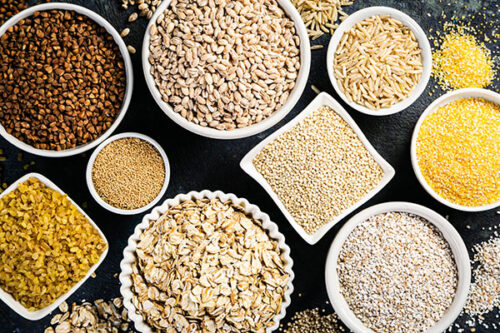How to Help the Volume Eater – The Person with a Binge Eating Disorder
Possibly disproving my usual preaching that people following our diet always lose weight and become healthier are a few extraordinary people I call “volume eaters.” They eat very large amounts of McDougall approved foods, and their weight remains stubbornly fixed at a point too high for excellent health—although they all lost initially after giving up the high-fat, high-calorie Western diet. I can vividly recall several men and a few woman who exemplify this behavior—and I know there are many more out there (in fact, I am guilty of a tinge of this behavior at times myself—“it takes one to know one”).
In my experience, a “big eater” might consume 2 plates filled 2 inches high with salad, potatoes, pasta, beans, and vegetables. The volume eater will put down three to five such plates—often in less than 20 minutes—a pattern repeated for breakfast, lunch and dinner. Their conveyor belt style of ingesting allows no time for the body and brain to register that they have eaten. By the time their abdomen is noticeably (and sometimes painfully) distended they will have consumed 2,000 calories at a single meal, which could mean 4,000 to 6,000 calories for the day. In the medical world a person with this pattern of eating is thought to suffer from a binge eating disorder.
Binge eating disorder is characterized by ingestion of very large meals without purging (throwing up) afterwards and is found in a subset of overweight individuals. These people are different for several reasons. They have been found to have larger stomachs than the average person of comparable physical size. Hormones governing eating and fat storage compound their troubles—they have higher levels of insulin (a hormone which forces fat into the fat cells) and lower levels of appetite suppressing hormones, like ghrelin. Volume eaters seem to derive a heightened sense of pleasure from eating, akin to that experienced by drug addicts using heroin. These “opioid-mediated rewards” play an important role in this form of hedonistic eating behavior. Thinking back on the people I know who are volume eaters, I would characterize their personalities as “driven,” and by no coincidence all have been financially successful in their individual businesses.
Possible Solutions
Binge eating disorder is a nearly impossible condition to treat by standard medical care. Many programs attempt psychological and behavior change with little success. More drastic treatments with gastric surgery (gastric banding and bypass) and drugs such as the anti-epilepsy medication, topiramate, are also used—unfortunately, the results are poor here too. Serious changes in eating behavior are the only real hope for these extreme personalities.
The most successful program for the treatment of people with serious eating disorders is the Kempner Rice Diet. This is a diet of rice, fruit, and sugar, plus vitamin and iron supplements, devised by Walter Kempner, MD, of Duke University in the 1940s to treat hypertension. The regular diet consists of about 2,000 calories daily and contains 5 gm or less of fat, about 20 gm of #, and not more than 150 mg of sodium. However, the initial diet prescribed for weight loss is even more restricted in calories (400 to 800 per day). In a study of the results published in the Annals of Internal Medicine, one hundred and six massively obese patients were treated as outpatients with the rice/reduction diet, exercise, and motivational enhancement under daily supervision. The average weight loss was 63.9 kg. (141 pounds). Forty-three patients achieved normal weight. Men lost weight at a greater rate than women. Along with the weight loss there were significant reductions in blood pressure, blood sugar, triglycerides, and uric acid levels. Heart sizes decreased, EKGs improved and blood vessels in the eyes appeared healthier. (For more information please contact: The Rice Diet Clinic, 3543 Rose of Sharon Road, Durham, NC 27712; Phone: (919) 383-7276 ext. 1; Fax: (919) 309-4695; ricediet@ricediet.com.)
Recommended Articles

The Truth About Starch (Anti Wheat Belly & Grain Brain)

How to Cook Beans






Join the Conversation!
Have a question, a helpful tip, or a story from your journey? Add it below - your voice matters.